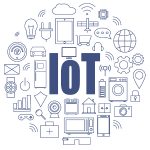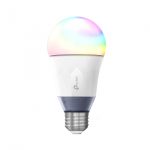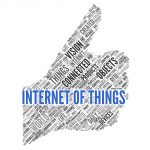New developer kit helps secure IoT devices

The rapid growth in numbers of IoT devices has seen them become a favored attack route for cyber criminals. This has left companies looking for a way to integrate strong security into millions of devices.
To address this problem, security platform Mocana is launching a new developer kit that provides businesses, who may not have deep cybersecurity or cryptography expertise, with a way to simplify the integration of hardware-based security features into IoT devices.
The Linux Foundation launches IoT-focused open source EdgeX Foundry, Ubuntu-maker Canonical joins

The Internet of Things is gaining in popularity just as many pundits have predicted for years. Having a connected home is easy and cost effective, thanks to devices like Amazon Echo, WeMo lights, and Nest thermostats. It really is an exciting time to be a tech-enthusiast consumer.
Unfortunately, while IoT is exciting, it can also be confusing and scary. Many devices do not work together due to fragmentation, and even worse, there can be security exploits that put the consumer's home network at risk. In other words, an internet connected refrigerator or webcam could be abused by hackers. Today, The Linux Foundation launches the open source EdgeX Foundry -- an attempt to unify and simplify the Internet of Things.
Will Internet of Things ever be safe?

The Internet of Things (IoT) has undergone an amazing transformation, from a pipe dream to a marketing buzzword, and now an impending reality. Recent estimates expect the number of Internet-connected devices to reach 26 billion by 2020, with some studies suggesting an even higher output.
With an exponential increase in devices communicating with us, other devices, and with the internet at large, how can anyone keep private information safe?
What is dark data?

As a society, and as businesses, we used to have a good handle on our data. We knew what it was, where it was kept, and we used it in a very formal way, treating it as something very precious. You could argue that a lot of it was always "dark," as it was locked in files and accessed only by those with physical proximity as well as the permission to use it.
Within organizations, data processing used to rely on very structured, defined data sets, but the rise of social data, the Internet of Things (IoT), machine learning and constantly connected devices has introduced a seemingly unlimited supply of unstructured data. It comes streaming in from multiple sources -- cloud data, device-driven data, social data, financial data, and everything in between...
Businesses are unprepared for the Industrial IoT

Many companies are unprepared for the Industrial Internet of Things (IIoT), even though most executives at those companies realize that the future of their business could depend on it, according to a new study.
The research from the Business Performance Innovation Network finds that 52 percent of executives at large enterprises -- and 41 percent of executives at all companies -- expect the IIoT to have a significant or major impact on their industry within three years.
UK businesses face nearly 500 attacks a day

OK, so, Beaming says UK businesses suffered, on average, 43,000 cyber-attacks in the first quarter of 2017 -- each. If this number sounds way too big, then it would be even more interesting to hear that this is actually seven per= cent lower than what was going on in the same period last year.
Breaking the numbers down, Beaming says each business gets attacked 474 times per day. Almost all of these attacks, 92 percent of them, are targeting Internet of things devices, such as networked security cameras or building control systems, as these IoT devices can be controlled remotely, over the internet.
Automation is the next level of digitization

So far, it's safe to say that the predominant trend in 21st-century business has been digitalization. Every industry, organization and individual has been touched by it one way or another.
As we head towards 2020, we are moving to the next level of digitalization. Now, what has already been digitalized will increasingly be automated -- whether it's the way we work, trade or connect with each other. Automation is becoming increasingly prevalent as computers gain in processing speed and power, and as the amount of data available for computation continues to grow exponentially. At the start of the Internet age, very few things were connected and available for analysis. But with the rise of the Internet of Things and the implantation of computers into all walks of life, from driving to warehousing, more and more facets of our world can now be mapped from within dedicated software.
Are bot-on-bot battles holding the IoT back?

We know by now that smart home devices have the ability to make our lives more convenient. Moving beyond devices, some IoT providers are deploying bots, which use artificial intelligence to create hyper-personalized services that will take consumer convenience to a whole new level.
Bots are a relatively new term for most, but this past year consumers have become more familiar with bots thanks mostly to conversations around chatbots. Recently, Wikipedia’s content-editing bots made the news too when Oxford researchers found that they were contradicting edits they were making to articles on the website. The bot-on-bot fights went unnoticed because our knowledge and understanding of how bots interact with one another is limited. As bots began to find their way into other services, we’ll see this problem span beyond Wikipedia, proving an enormous need to understand their interactions.
TP-Link Smart Wi-Fi Bulbs get color change Amazon Alexa skill

Turning on a lamp or other light fixture with your voice can feel like magic. I use the feature every day with my Amazon Echo and WeMo smart outlet. At the end of the evening, when heading to bed, I verbally tell Alexa to turn off the lamp. If I need to get up at night for, say, a drink of water, I can easily turn it back on the same way. It is great.
WeMo is not the only game in town, however, as there are plenty of smart outlets an bulb manufacturers. TP-Link is a popular manufacturer of smart devices, and its bulbs are compatible with Alexa voice commands too. Today, the company's color-changing bulbs are gaining a new Alexa skill. Using your voice, you can easily change the color or white balance with ease.
Ghost in the Shell: How much can it get right?

The new Hollywood sci-fi blockbuster Ghost in the Shell imagines 2029, a world where cyber terrorists hack into people’s digitally enhanced minds and where cyborgs have crises of identity. So, how much has it got right? Is this the future?
Should we be concerned that our cybernetic development, already constantly on-boarding new connected technology, will reach a point where our brains become both infected and controlled by rabid self-willed robots? Well, probably not just yet. But the question is there -- should we countenance such a dystopian scenario? Of course we should.
Connected devices can easily do cyber attackers' bidding

Connected cameras, vending machines or light bulbs were the vectors of the latest cyber-attacks. It is just the beginning of a long list of Internet of Things that will be used by hackers to take down businesses or steal data. But who should be blamed for this new situation?
We heard about the promise of a better life when everything will be connected to it. We trusted it because we loved the idea of having an easier life and access to more services at the same time. Manufacturers also saw a huge opportunity in that trend for new business, so everybody was happy.
Security professionals still struggle with the cloud and IoT

Organizations are using multiple cloud services and security staff are worried about the visibility problems this presents as well as the risks presented by IoT devices.
These are the findings of a survey of RSA attendees, carried out by security management and threat intelligence specialist AlienVault. A third of respondents to the survey describe the state of security monitoring within their organization as 'complex and chaotic'.
IKEA launches affordable smart lighting range

Love it or hate it, Swedish home furnishing brand IKEA has a strong track record of providing affordable, well-designed home wares with unpronounceable names.
The company is now moving into smart lighting with a range of remotely controlled energy-efficient LED bulbs, lighting panels and doors. There's also an app which allows you to personalize and control your lighting from your smartphone.
New platform protects industrial IoT devices

Internet of Things devices are the latest threat vector that businesses have to deal with, introducing a potential extra weakness into corporate networks and leading experts to warn of increased risk.
To help guard against the threat, Mocana Corporation is introducing a new security platform designed to protect IoT devices and associated device-to-cloud communications.
Businesses deploy sensitive data to new environments without adequate security

According to a new report, 93 percent of enterprises will use sensitive data in advanced technology environments (such as cloud, SaaS, big data, IoT and container) this year.
But 63 percent of those respondents also believe their organizations are deploying these technologies ahead of having appropriate data security solutions in place. These are the findings of the latest Data Threat Report from Thales e-Security and 451 Research.
Recent Headlines
BetaNews, your source for breaking tech news, reviews, and in-depth reporting since 1998.
Regional iGaming Content
© 1998-2025 BetaNews, Inc. All Rights Reserved. About Us - Privacy Policy - Cookie Policy - Sitemap.